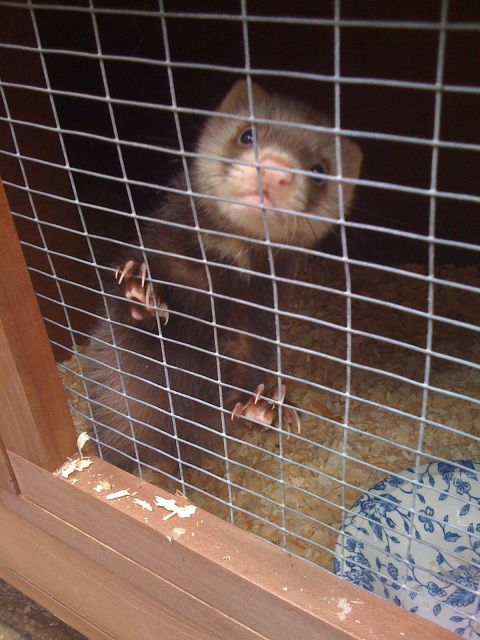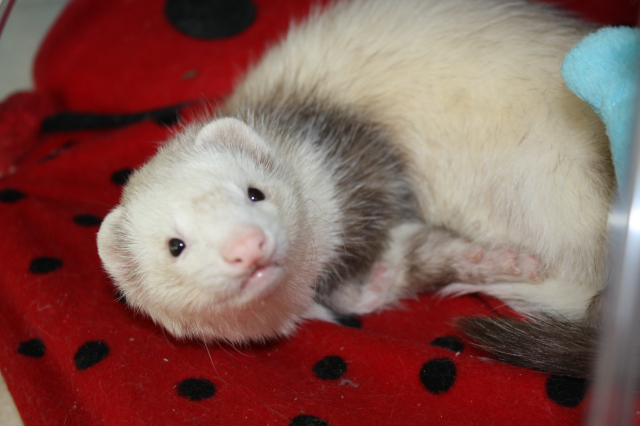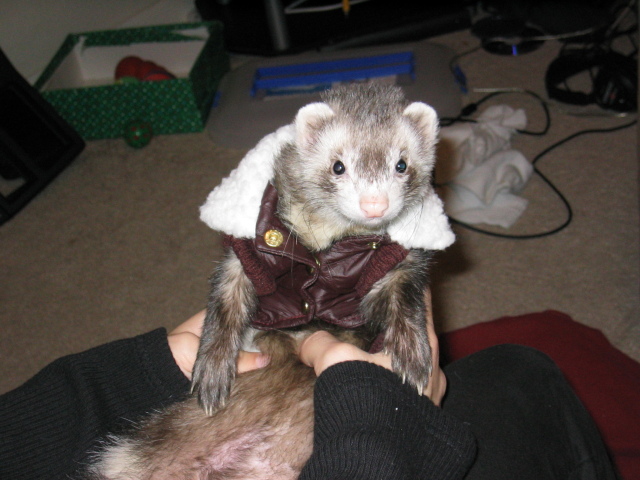QuestionHow does one go about ferret proofing a home? What are important things to look out for. Also, is there a way to prevent adrenal disease? I have heard that feeding a certain brand of cat food is better than some cheap ferret foods out there. Can you please tell me what some of the better foods are, and is there any that are reasonable in price? Thank you!
AnswerHi Ashley:
Excellent questions! Every ferret owner needs to know how to ferretproof their home - constantly. Ferretproofing is not something we do just once. I do it each and every day before I let the ferrets out to play. Because during the day people come and go in the house, bring things into the house, move things around, even something as 'innocent' as opening a window can suddenly be deadly to a ferret. So, each and every time BEFORE WE ALLOW OUR FERRETS OUT TO PLAY, we must scan the room looking for anything the ferret can get hurt on or break - they will often dig things to try to see what they are. Some dangerous things to watch for are: tools, small electric appliances, anything they can climb too high on like stacks of boxes, anything likely to chewed on (especially soft rubber items or foam rubber items like balloons, shoe insoles, rubber bands, erasers, earplugs, earphones, etc), anything that would entertain a ferret and likely contain anything a ferret should not have such as: a purse (too many dangers to list!), shoes, candy or gum, empty candy or gum wrappers (they will even swallow the foil because it smells good), cigarettes, ashtray & contents, any open drinks or food they can get to.
Ferretproofing means getting down on the FERRET'S LEVEL and looking at the world as a ferret sees it - can he get behind your stove? your refrigerator? There are electrical wires, fans and things back there that ferrets have NO business being near. If you cannot block a ferret from behind ALL major kitchen appliances, it is imperative that you block the ferret off completely from the kitchen.
In the livingroom, any furniture that 'moves' such as a recliner, rocking chair or hide-away bed are all "DEATH TRAPS" for ferrets. Many many ferrets die each year by getting trapped inside folding furniture and having someone sit on it, getting under a rocking chair as someone rocks back, getting arms/legs mangled in a recliner chair mechanism because they just didn't know the ferret could squeeze in that tiny space. These are all "NO-NO's" in a household with ferrets. If you have them, at least keep them in a room the ferret is NEVER allowed in. Better yet, keep them out of the house completely. It only takes seconds for someone who just didn't know to sit in the recliner while you are in the other room grabbing some snacks while watching the ballgame..and suddenly your ferret is maimed for life or killed. Your friend just had no idea. It happens all the time, unfortunately, so the best advice is to just not have the furniture in the house, then you don't have to be neurotic about telling everyone who comes in the door about not using certain pieces of furniture when the ferret is out - or making sure the ferret is NOT out when company is there...the kids WILL sneak him out when you're not looking! :-)
Here are some links on ferretproofing:
* http://www.ferretcentral.org/faq/part2.html#ferretproofing
* http://groups.msn.com/Ferret/yourwebpage10.msnw
* http://groups.msn.com/Ferret/ferretproofing2.msnw
Everyone has their own ways to do it. Everybody thinks of something that someone else forgot, so I recommend reading ALL of them - anything you can read on ferretproofing, read it. Then think of at least 10 or 20 more things in your house that apply to your particular situation and GET RID OF ANYTHING THAT IS A DANGER TO YOUR FERRET *OR* modify it in some way to make it 'ferret-friendly'. I block my ferrets off from my kitchen because I cannot find a way to keep them from behind the refrigerator. My favorite rocking chair cannot be in the livingroom because of my ferrets, even tho I rock them when they are sick...I take them to the chair in another room just to be SURE they can't get injured on the chair that brings them so much comfort. There are ALWAYS WAYS TO MODIFY THINGS TO MAKE THEM SAFE...if not, REMOVE THEM FROM THE ROOMS YOUR FERRET CAN GET TO. As many times as we say that, it's just never enough because as surely as I write this, tomorrow we will read about another ferret being killed in the mechanism of a recliner or smothered in a hide-a-bed because someone thought they could watch their ferret closely and be really careful.
The best way I found to keep ferrets out from underneath a couch is to turn the couch upside down and drill and screw 1" wood trim all around the bottom of the couch. Set it back upright and suddenly the ferrets can't get under it, so they can't rip the underneath lining they usually tear up and then make cozy little beds out of. There really ARE solutions if we just think things through. Ferretproofing is an ongoing process - it is NEVER finished.
There are not many "cat" foods that would qualify as good food for ferrets. Cat foods are usually too low in protein, too high in ash, too low in fat and have far too many grain fillers to meet a ferret's "obligate carnivore" nutritional needs. Obligate carnivore means that a ferret's stomach ONLY digests and is able to get nutrition from MEAT SOURCES.Since a ferret doesn't have a cecum, they cannot even digest plant material (fruits & vegetables of ANY KIND), so anything you feed a ferret that is not meat is junk food.Since they have such a fast digestive system and small stomach, it is very important that everything they eat be very high quality primarily MEAT PROTEIN. The ferret-specific kibble preparations such as Totally Ferret are made from processed chicken and chicken byproducts with fillers like rice or corn, just enough to be able to process the meat into a crunchy kibble form.
For good health, ferrets MUST HAVE a minimum of 37% protein and 20% fat in their diet. People who feed poor quality foods *think* they are saving money, but it is a false savings because that money is usually paid to the vet within a short period of time, as the ferret likely will start having health problems while still young and may require thousands of dollars of vet care through his lifetime. They have not only the cost in dollars, but the inconvenience and the pain of watching their pet suffer. If the cost of ferret food is a factor when considering purchasing a ferret, certainly one should pass and get a hamster or pet that doesn't require the specialized care and feeding that a ferret requires. Poor food usually shows up as early onset insulinoma, for example. Here's just a little information on that disease to give you an idea of the kinds of problems poor diet can cause:
http://www.ferretcentral.org/faq/med/insulin.html
NEVER FEED A FERRET: Dried fruits, vegetables, candy, gum, chocolate, raisins (They have been found to cause kidney failure and AS FEW AS FIVE RAISINS CAN KILL a young healthy kit!)... PEOPLE FOOD YOU CAN FEED TO A FERRET: feed meat - raw or cooked, any kind, but NO COOKED BONES because cooking makes the bones splinter; and cut-up hard-boiled eggs (cooled) are great snacks if you must feed people food. I will give you a food chart that has various ferret foods, a few kitten foods and even a cat food or two. It's what is IN the food that's important. You will be looking for a minimum 37% ANIMAL PROTEIN, 20% ANIMAL FAT - those are the most important numbers to remember. We want to see MEAT SOURCES as much as possible and VEGETABLE FILLERS (corn,rice)as few and as small a percentage as possible because the ferret gets NO NUTRITION FROM THEM. It's important that as ferret owners WE read the labels - there are food manufacturers out there such as Kaytee that make and market products like Kaytee Fiesta that is outright DEADLY TO FERRETS (intestinal blockage) and they are still allowed to put it on the shelves and sell it to us to take home and kill our ferrets with!! That's OUTRAGEOUS!! That's just one example of why it is so very important that we read labels! Here's the chart:
http://www.mdferretpaws.org/care/food_treats.html
I think it depends on where you live as to which of the foods would be available in your area. A good lot of these I've never seen where I live. I can get almost any of them online, though. A quick check with almost any of the online ferret stores and/or pet food stores and we can quickly see that any of these foods can be on our front doorstep in a matter of just days as long as we have a credit card. I don't always think that the most expensive food is necessarily the *best* food - however in the case of ferrets, since it IS necessary that the food have primarily MEAT ingredients, the cost does tend to be the more expensive ones that actually do meet the nutritional needs of ferrets best.....but then again, don't go and spend a bunch of money on a food just because it's expensive - your ferret just might not like it! Every ferret "imprints" on his food early in life and some are easier than others to change to new foods and tastes.
It is always recommended to make any food changes gradually, starting with about a 90% old food and 10% new food mixture and slowly increasing until you are finally feeding 100% new food. It is recommended that the two foods be stored "mixed together" so the flavors and smells blend, which helps the ferret accept the new food. A word or warning here, though. Do keep a weeks worth of "pure" 100% old food, JUST IN CASE your ferret absolutely refuses the new food. It does happen. If it happens, you don't want to find yourself with nothing your ferret will eat. Unlike other animals, ferrets really will starve themselves because they sometimes just don't recognize other, new smells as food and/or just don't like the new food. The old idea of "if he gets hungry enough, he'll eat it" definitely DOES NOT HOLD TRUE WITH FERRETS. A ferret who goes 8 hours without eating is in serious trouble and MUST be fed something or be admitted to an animal hospital for emergency feeding either through a tube or IV's. A ferret WILL starve itself to death, so please don't think they won't. Often, once they begin not eating, they don't have much of a choice of not continuing. They become too sick from not eating and then CANNOT eat without medical help. Ferrets become dehydrated quickly and get into trouble quickly without food or water. This is why most ferret owners have a favorite 'recipe' for 'duck soup' of some sort.....it's not made of duck and it's not really soup! LOL It is named after a ferret named "Lucky Duck" and was a concoction his owner made by grinding his kibble and some baby food and water, warming it and feeding it to him when he wouldn't eat - thus all 'mush' we feed ferrets to enrich their diets is referred to as 'duck soup' :-) I prefer the lazy man's way and keep two sources of duck soup on hand: several cans of Hill's Feline A/D (a canned prescription diet) and water warmed and made to gravy thickness; OR Uncle Jim's Duk Soup Mix, which comes in a jar by Marshall's. I use this along with Vetasyl for my hairball remedy (see my many hairball replies for details on how to make it) and it makes a great 'soup' also. Anyway, when you choose a food, remember that you will also need to get your ferret familiar with a 'soup' before he needs one. The perfect way is to give him a monthly hairball treatment using the Duk Soup Mix.
ALSO, one last note - most ferret owners recommend you mix at least two top quality feeds for your ferrets food. Just in case (yes, it happens often) the manufacturer changes the recipe, suddenly the ferret may stop eating if the change affected the taste of the food. If your ferret eats ONLY that food, this could suddenly be an emergency as you search frantically for another food your ferret will eat. If your ferret already eats a mixture of TWO or more top quality foods and one changes, you simply continue to feed it along with the other food that did NOT change and HOPE they don't notice; if they DO notice, at least you do still have something they will still eat. Sounds far fetched, but it wasn't all that long ago that Iams changed their Kitten kibble and many folks panicked!
Hope this has helped at least give you some ideas. There is a great book called FERRETS FOR DUMMIES by Kim Schilling that is GREAT reading for all new ferret owners. There is so very much more than just ferretproofing and proper nutrition - although those are probably two of the most important topics for new owners - and she covers all of them in her book - ALL FERRET OWNERS SHOULD OWN A COPY! You might be able to get a copy from eBay or half.com, or your local bookstore or pet store. And keep asking questions; it's up to US to learn all that these precious little ones cannot tell us :-)
Sincerely,
Jacquie Rodgers

 SWOLLEN FEMALE PARTS
QuestionSmokey napping
QUESTION: Hello, I have a
SWOLLEN FEMALE PARTS
QuestionSmokey napping
QUESTION: Hello, I have a
 Maggots found in ferret cage?!
Question
Cloud and Bandit
So i have had my femal
Maggots found in ferret cage?!
Question
Cloud and Bandit
So i have had my femal
 biting
Question
rascal
hey, i have just bought my first ever f
biting
Question
rascal
hey, i have just bought my first ever f
 Shes so nippy
Question
Delilah
My boyfriend got me the cutest
Shes so nippy
Question
Delilah
My boyfriend got me the cutest
 Eros
Question
Eros
Hello. My ferret, Eros, just turned
Eros
Question
Eros
Hello. My ferret, Eros, just turned